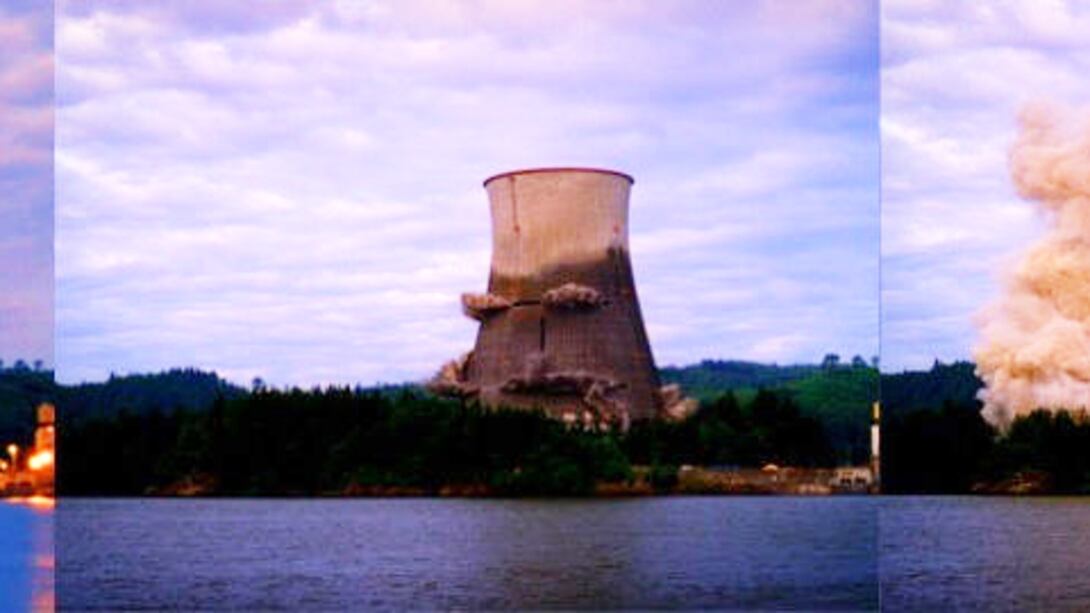“Every tool in the toolbox.”
Documentarian Jan Haaken has heard recent proponents of nuclear power employ the phrase “like a mantra” when discussing the fight against climate change. Having made a two-part film about that planetary emergency (Necessity), Haaken understands the fight. But not every tool is worth reaching for, posits her new documentary, Atomic Bamboozle.
Haaken, a professor emeritus of psychology at Portland State University and director of documentaries about abortion providers (Our Bodies Our Doctors), dairy farmers (Milk Men) and drag queens (Queens of Heart), now explores what she calls a “repackaging” of nuclear power in the form of small modular reactors, or SMRs.
Interviewing physicists, activists and conservationists, the 46-minute film portrays a nuclear industry rising quickly while downplaying nuclear power’s most crucial and recurring issues—those unresolved and unchanged by SMRs.
“I think there are genuine believers in nuclear power—that it will produce a net gain,” says Haaken, who will host Atomic Bamboozle’s Portland premiere at Cinema 21 on March 12, followed by a panel of speakers from the documentary. “I wouldn’t malign everyone who would take that position; I just think they’re wrong.”
Haaken began work on Atomic Bamboozle in early 2022 with a seed of curiosity planted by Indigenous leaders featured in Necessity. At that time, Cathy Sampson-Kruse, an activist from the Confederated Tribes of the Umatilla Indian Reservation who appears in Atomic Bamboozle, spoke on the dangers of nuclear power alongside fossil fuels, which Haaken originally found to be off-message. The filmmaker describes herself as being previously “agnostic” about small modular reactors.
But Sampson-Kruse had witnessed up close what the ongoing disaster at the Hanford Nuclear Site had wreaked on land, water, wildlife and Indigenous tribes along the Columbia River. And while the U.S. Department of Energy has embraced nuclear power’s potential to meet carbon reduction goals, a conspicuous SMR branding push associated with youth and portability inspired Haaken to start reading public reports and interviewing regulators and engineers.
“It had a strong whiff of propaganda…dominated by pro-nuclear forces,” she says. “So I thought it was important to have some kind of intervention.”
Atomic Bamboozle concludes that, beyond their size, SMRs are essentially no different than the Trojan Nuclear Power Plant that Oregon shuttered in 1992 after decades of protests.
Spotlighting the efforts to close down Trojan in her film, Haaken says the push for new nuclear power is exploiting a “generational amnesia,” appealing to millennials who’ve grown up with global warming in the discourse, but not nuclear accidents or proliferation.
Perhaps most critically, Haaken says, the United States is no closer to creating a permanent repository for nuclear waste than it was a half-century ago. Meanwhile, experts like geochemist Lindsay Krall state in the film that SMRs will produce more waste per megawatt hour than large reactors.
There’s no “Daisy Girl”-style terror montage in Atomic Bamboozle. Rather, it systematically underlines issues Haaken says SMR companies like Tigard-based NuScale aren’t addressing. At the same time, there are five nuclear-related bills before the Oregon Legislature, two of which aim to repeal the 1980 moratorium against building new plants in Oregon until a permanent federal repository is confirmed.
Despite ongoing, high-profile disasters like the Hanford Site in Washington and Fukushima in Japan, Haaken acknowledges that the nuclear industry has a good safety record by some metrics. Yet she contends that such metrics don’t account for the permanence of waste, what accidents could do to ecosystems like the Columbia River, and how communities local to reactors and waste storage—often Indigenous—are left to pay the price.
Haaken expresses understanding of how desperate Americans might feel amid a climate crisis, but she compares the entrepreneurial and governmental push toward nuclear power to “magical thinking” she’s witnessed while making other films. In Mind Zone, for example, Haaken followed therapists deployed to Afghanistan and observed how cutting-edge treatments were celebrated as high-tech solutions to keep soldiers in the field.
“In difficult dilemmas, people are very vulnerable to…technology with shiny appeal,” Haaken says.
While conservation and renewable energy lack the sexiness of Tomorrowland-style branding, Haaken argues, she supports reaching for those answers in the so-called toolbox.
“With nuclear,” she says, “we’d be pinning our hopes on something with such a history of heartache.”
SEE IT: Atomic Bamboozle plays at Cinema 21, 616 NW 21st Ave., 503-223-4515, cinema21.com. 3 pm Sunday, March 12. $8-$10.
